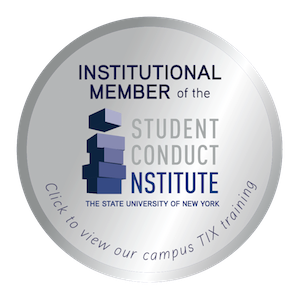About Title IX

Title IX of the Education Amendments of 1972 is a federal civil rights law that prohibits sex discrimination on the basis of sex in educational programs or activities that receive federal funding. This includes admission into the university, financial aid awards, athletic programs, internships, school-related conferences, participation in club sports and organizations, and other SUNY Fredonia sponsored activities.
Under Title IX, discrimination on the basis of sex may include sexual harassment, sexual assault, dating violence, domestic violence, stalking, pay inequity, and pregnancy discrimination. The University also prohibits discrimination on the basis of sexual orientation, gender identity and gender non-conformity.
On May 19, 2020, the U.S. Department of Education issued a Final Rule under Title IX of the Education Amendments of 1972 that provided further guidelines for colleges and universities regarding their Title IX policies and processes. These new federal guidelines went into effect on August 14, 2020. A Summary of Major Provisions of the Title IX Final Rule is also available. At the request of the survivor, instances of sexual violence that do not fall under the Title IX guidelines will still be investigated by the University under the University's Code of Conduct.
Violence Against Women Act & Enough is Enough
An amendment to The Violence Against Women Act (The Campus SaVE Act) and New York State Law 129-B (Enough is Enough) also prohibits sexual assault, dating violence, domestic violence, and stalking in higher education, and applies to all students, regardless of sex or gender identity. University policy also prohibits this kind of sexual violence/misconduct.
Title IX & SUNY Fredonia
Sex discrimination includes sex, sex stereotypes, sex characteristics, pregnancy or related conditions, sexual orientation, and gender identity. It also includes sexual harassment, sexual assault, dating violence, domestic violence, and stalking. The Title IX Coordinator ensures that the process for addressing complaints of sex discrimination and harassment are handled promptly, fairly, and equitably, with due process. The Title IX Coordinator is not an advocate.
The Title IX Coordinator is responsible for ensuring compliance with Title IX law, the Campus SaVE Act, and New York State Education Law 129-B ("Enough is Enough"), as well as campus policies and procedures on sex discrimination. The Title IX Coordinator's role is to explain students' rights, the Title IX Grievance Policy/Procedure, process, connect students to resources, provide supportive measures, and ensure students are not being retaliated against for having made a report of sex discrimination. If a faculty or staff member is involved, the Title IX Coordinator will work with SUNY Brockport’s Affirmative Action Officer to follow the complaint process involving employees.
The Title IX Coordinator also helps develop sex discrimination and sexual violence prevention initiatives, including trainings for students, faculty, and staff.
Students' Bill of Rights
Copies of the Students' Bill of Rights shall be distributed annually to students, made available on every University’s website, and posted in each campus residence hall, dining hall, and student union or campus center and shall include links or information to access the Sexual Violence Response Policy below and the Options for Confidentially Disclosing Sexual Violence.
Consent, for the purposes of SUNY Fredonia's Title IX Grievance Policy, means a knowing, voluntary, and mutual decision among all participants to engage in sexual activity. More on SUNY Fredonia's definition of consent.
Sexual harassment includes any conduct on the basis of sex that satisfies one or more of the following:
- An employee conditioning educational benefits on participation in unwelcome sexual conduct (i.e., quid pro quo);
- Unwelcome conduct that a reasonable person would determine is so severe, pervasive, and objectively offensive that it effectively denies a person equal access to the educational institution's education program or activity;
- Sexual assault (as defined in the Clery Act), which includes any sexual act directed against another person, without the consent of the victim including instances where the victim is incapable of giving consent;
- Dating violence (as defined in the Violence Against Women Act [VAWA] amendments to the Clery Act), which includes any violence committed by a person: (A) who is or has been in a social relationship of a romantic or intimate nature with the victim; and (B) where the existence of such a relationship shall be determined based on a consideration of the following factors: (i) The length of the relationship; (ii) The type of a relationship; (iii) The frequency of interaction between the persons involved in the relationship.;
- Domestic violence (as defined in the VAWA amendments to the Clery Act), which includes any felony or misdemeanor crimes of violence committed by a current or former spouse or intimate partner of the victim, by a person with whom the victim shares a child in common, by a person who is cohabitating with or has cohabitated with the victim as a spouse or intimate partner, by a person similarly situated to a spouse of the victim under New York State's domestic or family violence laws or by any other person against an adult or youth victim who is protected from that person's acts under the domestic or family violence laws of New York State.;
- Stalking (as defined in the VAWA amendments to the Clery Act), meaning engaging in a course of conduct directed at a specific person that would cause a reasonable person to (A) fear for their safety or the safety of others; or (B) suffer substantial emotional distress.
